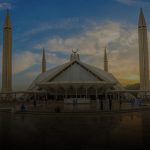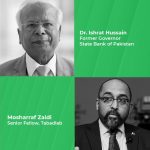You can download the e-reader friendly version here.
Is Climate Change Altering Megacities like Karachi?
The exponential threat of the climate crisis primarily impacts urban life through the rise in diseases, urban flooding, droughts, and storms. Recent flooding in Karachi, a mega-city by any definition, has renewed concerns about its ability to cope with the effects of climate change. Tabadlab Policy Roundtable 14 speaks to a panel of regional experts on climate change, cities, and development to understand the ecological, sociological, and economic challenges that limit Karachi’s capacity to withstand natural disasters.
Featured Panelists

Dr. Erum Haider is an Assistant Professor in Politics and Environmental Studies at the College of Wooster

Nazish Brohi is a Social Sector Consultant with core competencies in research, analysis, evaluation, policy formulation and program development

Dr. Saleem H. Ali is the Climate Change Advisor on United Nations International Resource Panel
Discussion Summary
Infrastructure and Design
Can we build resilient infrastructure that can withstand flooding and climate change? Most buildings in Karachi are made of brick and hence are less vulnerable to natural disasters, but there are major flaws in city infrastructure such as lack of drainage systems or proper roads. However, it is also clear that climate change will affect even the most well-designed cities.
Politicization
Does the politicization of infrastructure and design form a barrier to urban reform in Karachi? Discussions surrounding Karachi’s infrastructure often transform into intense debates about political responsibility that detract from the issue at hand. Our panelists also discuss how attempts to reclaim public land from the grips of privatization and land mafias have produced fatal consequences that deter stakeholders from working for Karachi.
Understanding the Larger Ecosystem
It is important to recognize that megacities like Karachi are part of a greater environmental and sociological ecosystem. Climate events are butterfly effects in which the melting of a glacier in north Pakistan can alter river flows in south Pakistan. Sociologically, Karachi also does not have a coastal culture despite being a coastal city. This has led to a current reality in which the majority of the population cannot swim, citizens are evicted from their property to allow land development, and forests are being erased to produce housing societies and thoroughfares.
Population and Migration
How does population growth and migration affect Karachi’s capacity to withstand the consequences of climate change? In 1947, Karachi’s population grew by about 2000% and has only increased because of rural to urban migration. Will a megacity that is already stretched for resources because of a growing population ever be able to survive climate change?
Socioeconomic Divides
Our roundtable participants discuss how citizens with greater access to wealth and resources have the ability to opt out of the public system and disengage from the political process. This leaves stakeholders with lesser means to entirely rely on the public system, thus creating a socioeconomic divide in the city. Therefore, issues like climate change often do not become politically salient until they affect citizens with access to wealth.





